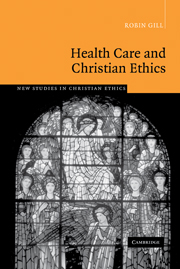Book contents
- Frontmatter
- Contents
- Series editor's preface
- Acknowledgements
- Introduction
- 1 Moral gaps in secular health care ethics
- 2 Tensions in public theology
- 3 Healing in the Synoptic Gospels
- 4 Compassion in health care ethics
- 5 Care in health care ethics
- 6 Faith in health care ethics
- 7 Humility in health care ethics
- Conclusion
- Bibliography of works cited
- Index
1 - Moral gaps in secular health care ethics
Published online by Cambridge University Press: 22 September 2009
- Frontmatter
- Contents
- Series editor's preface
- Acknowledgements
- Introduction
- 1 Moral gaps in secular health care ethics
- 2 Tensions in public theology
- 3 Healing in the Synoptic Gospels
- 4 Compassion in health care ethics
- 5 Care in health care ethics
- 6 Faith in health care ethics
- 7 Humility in health care ethics
- Conclusion
- Bibliography of works cited
- Index
Summary
Within the secular post-Enlightenment tradition following Kant moral agency was characteristically perceived as being independent of religion and based instead upon autonomous rationality alone. Thus, the individual makes moral choices and decisions based solely upon rational criteria that are available to all competent, rational agents (whether they are themselves privately religious, as Kant was, or not). Alasdair MacIntyre's seminal After Virtue challenged this understanding of moral agency. At a negative level, he argued that moral philosophy – the discipline concerned with autonomous, rational criteria in moral thinking – has been unable to deliver indisputable rational criteria or universally agreed moral decisions. Incommensurable differences remain on key moral issues such as abortion or justice both within the general public and (especially and most significantly) among experts in moral philosophy. At a positive level, he argued that virtues moulded by moral and often religious communities are essential to an adequate understanding of moral agency. Charles Taylor's Sources of the Self also challenged a purely secular understanding of moral agency. Although more committed than MacIntyre to a notion of autonomy within moral agency, he nevertheless argued that moral reasoning cannot be properly understood without acknowledging the long history of moral concepts within specific and typically religious communities.
MORAL GAP ONE
A central part of MacIntyre's critique of moral philosophy is that it makes claims for secular reasoning that it is unable to deliver.
- Type
- Chapter
- Information
- Health Care and Christian Ethics , pp. 16 - 33Publisher: Cambridge University PressPrint publication year: 2006



